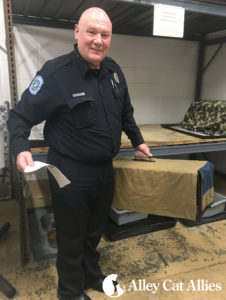Tim Reeder recently retired after 30 years of dedicated work as an animal control officer with Huntsville Animal Services in Alabama, but not before leaving a lasting lifesaving legacy for cats. In his time on the job, Reeder saved countless animals’ lives and helped kickstart a successful Trap-Neuter-Return (TNR) program.
He became an ACO in 1987, before TNR was an established method to address community cat populations. Reeder watched as far too many cats were killed at the shelter because they were not socialized or adoptable. Then in 2010, Huntsville Animal Services learned about Return to Field (RTF), a version of TNR in which ACOs or shelter staff have an active role.

Tim Reeder made a lifesaving difference for community cats during his 30-year career as an animal control officer.
Many of his fellow officers were skeptical, but Reeder connected with the community and learned that residents had been doing TNR for years. So, when the City of Huntsville officially adopted RTF in 2014, he was comfortable taking the lead on the program. Good thing, as the program served the entire county and Reeder was the only officer who knew the area like the back of his hand. He could return cats to areas even GPS couldn’t pinpoint.
A hard worker and enthusiastic people-person, Reeder often clocked in overtime to help more animals and residents. For over three years, he single-handedly trapped cats, transported them to a veterinary clinic for spay and neuter, vaccination, and eartipping, then returned them to their colonies. In 2017 alone, he helped 723 cats through the program.
“Out of the hundreds and hundreds of “˜returns’ I did for community cats, only five or six people had issues,” says Reeder. “It’s a misconception that people will push back a lot on TNR. When I explained to them that the cats would be neutered and come back to live out their lives with no kittens, the majority were just fine with that.”
The result of Reeder’s hard work were inspiring. Fewer cats were coming into the shelter and there was less stress on the shelter staff.
“If you don’t have those cats in the shelter, you’re not having to spend your resources caring for them or euthanizing them or stressing out employees who have to do both,” he says.
Reeder was so inspired by the success of Huntsville’s RTF program that he gave talks and webinars to teach other ACOs and shelters how to create their own. First, he recommends, get your city’s ordinance changed to recognize community cats and make sure their caregivers aren’t subject to licensing or ownership laws. Then ensure the program has strong leadership.
“If officers see that their supervisors and managers aren’t 100 percent behind the program, they won’t be either. And if residents sense that officers don’t care, they won’t be supportive,” says Reeder. “Always lead by example.”
Most importantly, Reeder says, never underestimate the importance of educating and cooperating with the community.
“I can write tickets all day but if I don’t educate the person, I’m just wasting my time,” says Reeder. “It’s the same for RTF. People think shelters have a line of people waiting to adopt cats, and it’s just not true. If you tell them otherwise, that what you’re doing saves cats’ lives, they’ll get on board quick.”
Reeder can enjoy his retirement knowing he established a program that will allow Huntsville Animal Services to save community cats’ lives for years to come. Alley Cat Allies thanks Tim Reeder for his hard work and hopes his story inspires other ACOs to follow in his footsteps.

